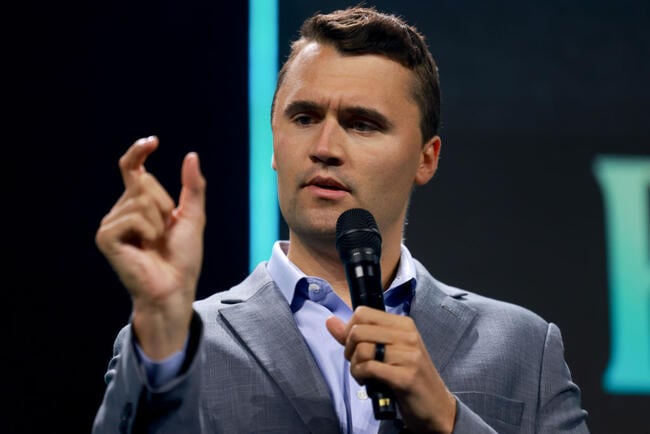You have /5 articles left.
Sign up for a free account or log in.

Charlie Kirk speaks during a Turning Point USA event in July 2024.
Joe Raedle/Getty Images News/Getty Images
I have sat in your lecture hall and been silent so you could speak. Now because of a heinous killing, you are silent. So I step to the podium.
In the last few days, so many people have asked me about your legacy, especially concerning higher education. My thesis: You changed college campuses. The size of the crowds, the number of Turning Point USA chapters—and of course that change played a key role in the broader victories of Donald Trump, who has brought so much change to colleges and universities.
I’ve deliberately left out any adjectives there to suggest a negative or positive change. To say it’s complicated is an understatement. As someone who was targeted by you and your organization, Turning Point USA, on its original Professor Watchlist, and then as someone who has written about you highly critically for years, as you might imagine, my feelings and the facts I choose to highlight are complicated.
I think you disdained the role of the public intellectual I claim to be. I think your debates on campus were polite but not helpful to the goal of higher education. Which is why I never participated and encouraged others not to.
I think you were smart, well-read and would have done well in college. But I think the chip on your shoulder about not finishing college remained, and your years on campus only made it worse.
On a larger scale, the wake of the terror and harassment from TPUSA’s Professor Watchlist is long and wide. You encouraged students to record their professors, cutting at the heart of the trust needed in classrooms. My colleagues and I have been broadbrushed as purveyors of -isms and ideologies you claimed were destroying America, and we have suffered wrongly for that. And because of that some students leave campus with a disdain for us and higher education.
Counter to that, because of you, many students have been energized and activated politically. Many have taken on civic duties at all levels. An army of debaters, political operatives and candidates has been grown by you. Because of you, many young men and women have matured intellectually, and many children will undoubtedly be named Charlie. Because of you, there are more voices on campus and fuller points of view. As a professor, I applaud that.
In the aftermath of how you were killed—speaking on campus, as you had done many times—I think it’s important to also take an opportunity to offer space for us to both speak at the same time. A lecture of two. What would we agree on under the umbrella of higher education?
I think we both would applaud the return of the discipline of rhetoric, one of the skills of a classical education you advocated for. I think we would agree that higher education institutions have become not merely cumbersome but bloated, like the “big government” that you thought sucks.
We both would likely agree a general education should include history, government, science, math and perhaps an English class where that rhetoric can be taught.
While I may have given you bad marks for your writing debut in 2012 for Breitbart, it certainly was no worse than that of any first-year student I see. I think we both would agree that you have gotten better as a writer and communicator because of the many great books you have read. As should happen with any lifelong learner, the cultivation of which is one of the goals of higher education.
I also think we both would agree a democracy needs an educated public, one that understands rights and responsibilities. We both would agree that not everyone needs a college degree but higher education should be open to everyone. We both would agree that this country’s “blue-collar” workforce is not at all uneducated. We both would agree that indoctrination is what cults do, not what professors or pastors do.
We both would agree that the relationship between Jerusalem and Athens, between faith and the academy, has been explored by many, and they were better for it. We both would agree that assigning Plato and Aristotle would be good, as I have at times. And because those are hard-to-understand but wise authors, I think we would agree everyone needs a teacher and that reading alone has fostered alienation that can be best assuaged by the intimate setting of reading together.
I often end my lectures with a few questions, a way to invite thinking about what comes next. I’ll leave aside for now what I have been asked a lot: What comes next for Turning Point USA? Whether it aims to rout more radicals from their tenured perches is not up to me. I can ask different questions, though.
As an academic, I ask, how are we to understand the societal forces at play that drove the person who killed you? How are we to understand the link between your death and gun policy? How are we to understand your supporters’ claim about your martyrdom in relation to the dead schoolchildren of Newtown, Uvalde, Parkland and on and on and on? Or the campus victims at Virginia Tech, Florida State or Kent State and on and on and on? What theories and concepts would help us?
As a Christian in higher education, I ask about the human behind the gun that shot you. I ask about the sad student on yet another rooftop, seemingly alienated enough from life to snuff out another’s. I ask, like you, what is becoming of our young men.
As a person who wants to see higher education become the economic and cultural powerhouse it was designed to be, I wonder if it will. I wonder if I will get to finish my career on campus. I wonder if the attacks from groups like TPUSA will bring higher education to its knees.
And finally, as a writer and thinker and civic activist who has followed your career, and yet who will now never get to shake your hand, can I ask, if it be possible, that if our children meet at college, could they tell good stories about us? Could they define our legacy?



